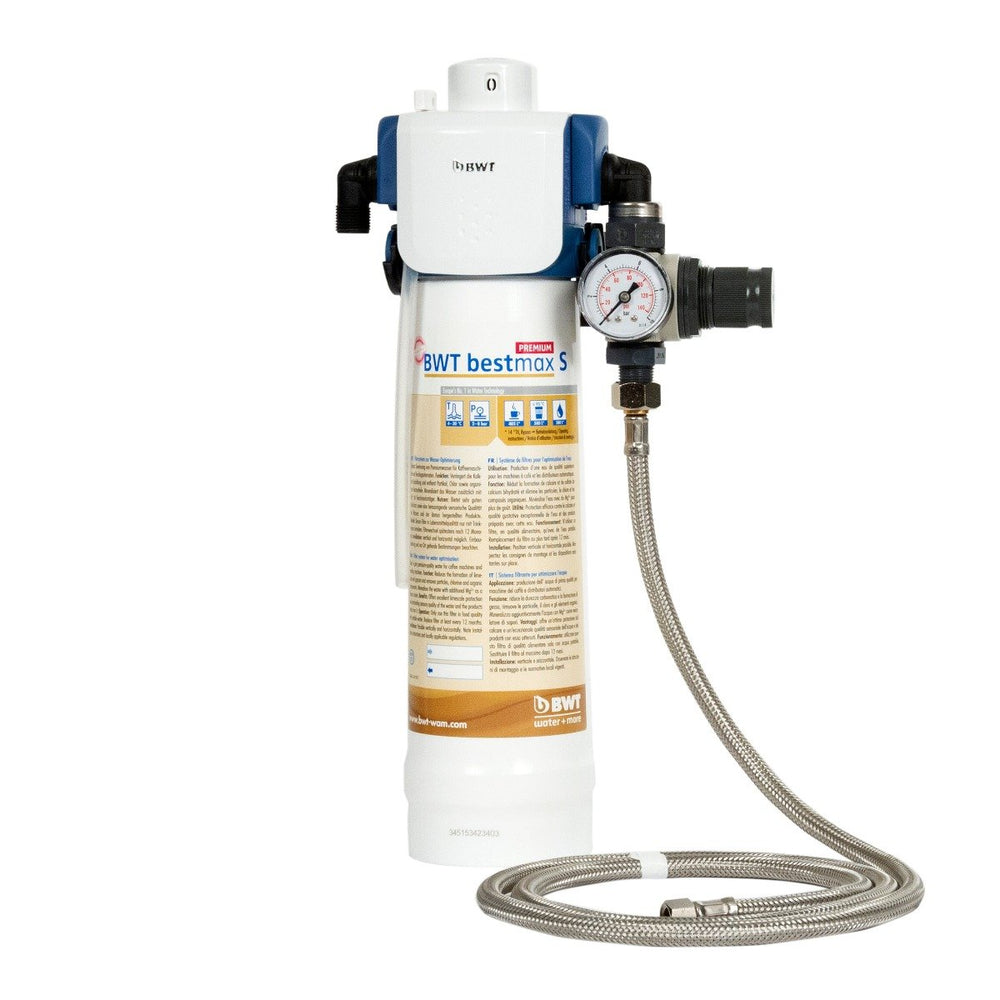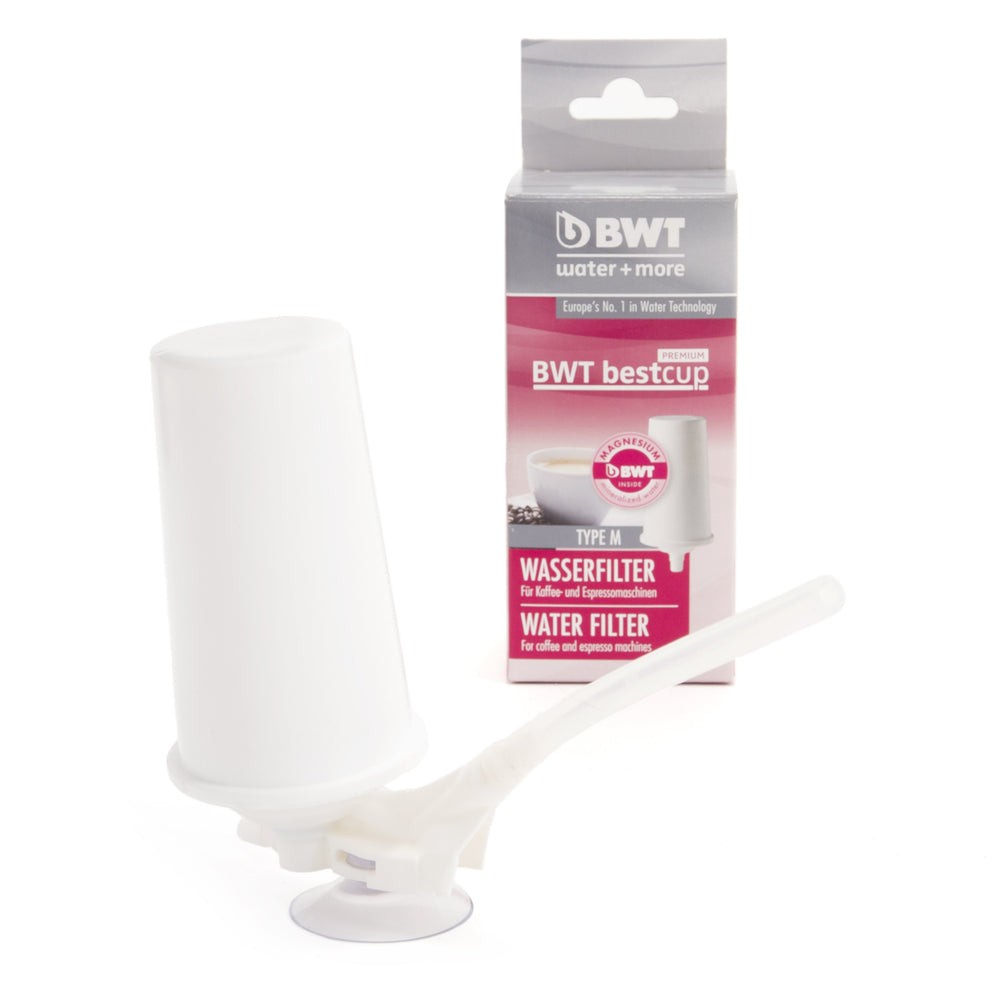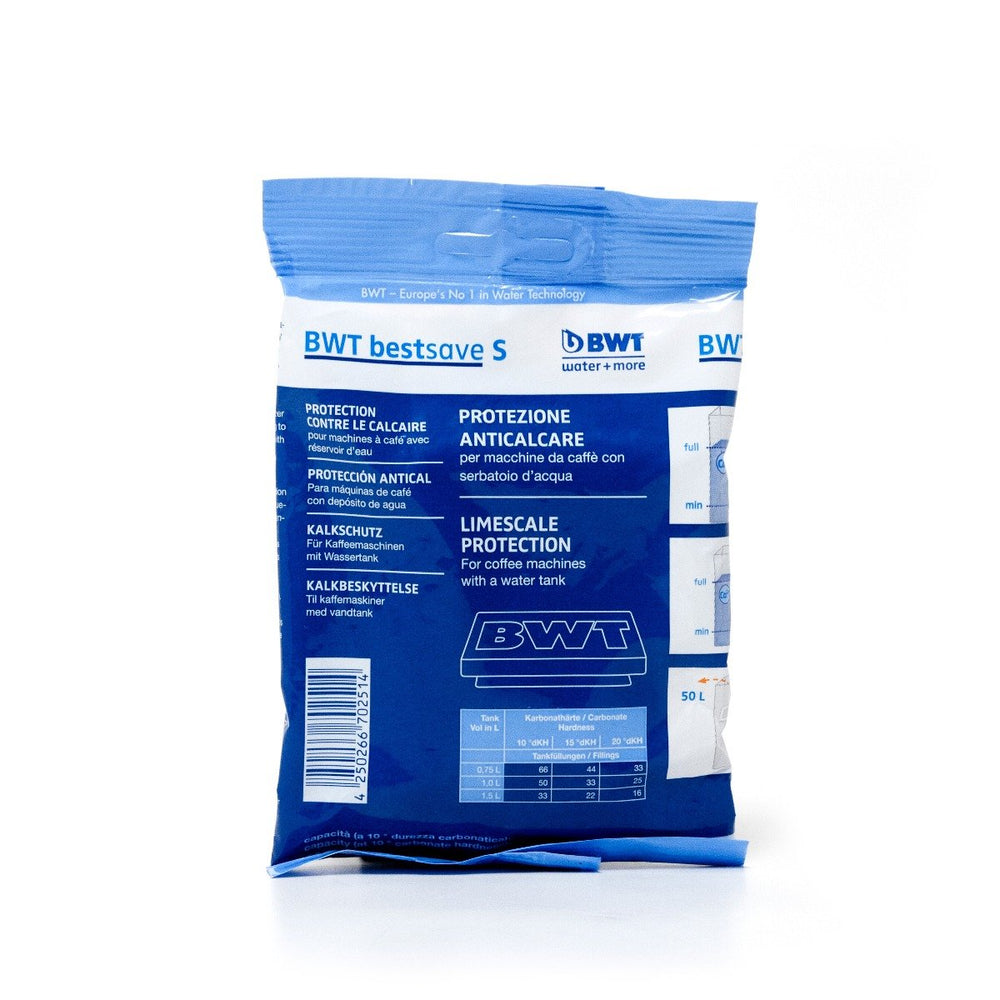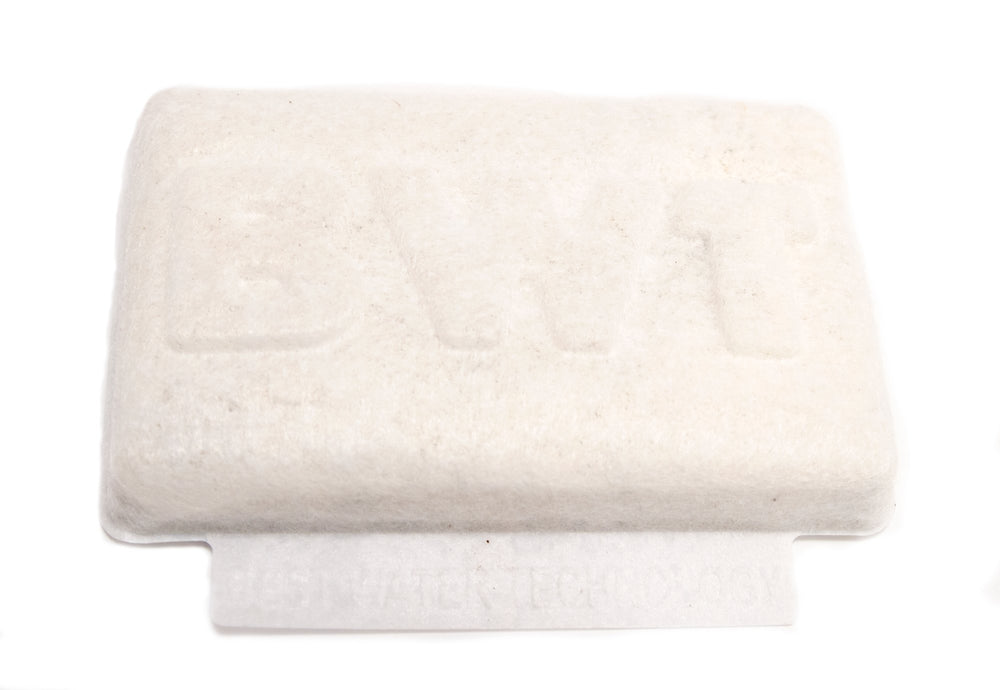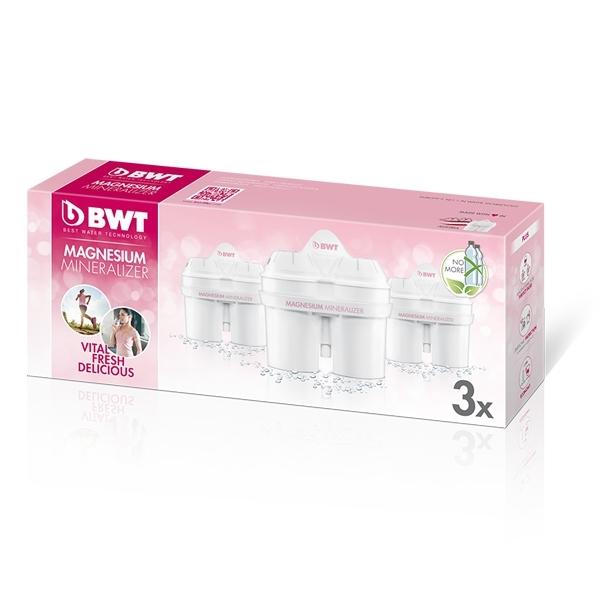BWT Water Filters for Espresso Machines
Growing up in Upstate New York, I enjoyed some tasty tap water. At the very least we didn’t buy bottled water like some friends of mine. While the young me definitely appreciated the convenience of drinking from the sink, it also meant that water filtration wasn’t on my mind until much later in life. Fortunately, I’ve never had to descale myself, but apartment living has shown me the benefits of filtering tap water. After attending a water quality seminar at the SCA expo and spending some quality time with Marc and Todd, these days I fancy myself to be something of a water expert.
Generally speaking, there are two key factors that make filtering a necessity: flavor and scale buildup. If your water tastes gross, you don’t want to drink it. This, of course, means that you’ll have gross pasta, gross tea, and gross coffee if you decide you want to cook or brew anything with it. So, it makes sense that you’d want to screen out some of those contaminants rather than drinking them. The second factor, scale, is a silent killer of espresso machines. Chances are you’ve seen it build up around your sinks, showerheads, and at the bottom of your pots. For the most part, espresso machines are full of water and pipes.
The scale that you see building up in your bathroom or kitchen will also build up inside of your machine. That’s where water filtration, or water softeners, come into the mix. We’ll be talking about two types of filters primarily, inline (meaning the filter is connected to a water line that is plumbed into your espresso machine) and in-tank (meaning the filter sits in the reservoir of your espresso machine). Before getting to the filters themselves though, we’ll take deeper dive into the topic of water.
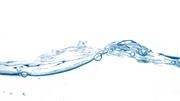
Best Water for Coffee and How to Make the Best Tasting Coffee
How Water Affects the Flavor of Your Coffee
As I mentioned above, it follows that if your water tastes funky, that same funk will be imparted to anything you cook or brew. When it comes to brewing coffee and espresso, there are already a ton of factors like temperature, consistency of grind, fines, roast profile, freshness, and of course the origin of the coffee that will impact the flavor in your cup. Adding to the complexity is the fact that your water may contain any number of contaminants (or minerals) that will impact the taste and affect the extraction of your coffee. Even if your water has been softened there’s a chance it may contain other substances that make it onto your palate so it’s super important to find the best water filter for your needs to ensure you’re getting a good cup of espresso. Let’s take a tally of some of the culprits behind bad tasting water.
Flavor Haters
Chlorine
That’s right, the same chemical used to clean your pool also keeps your drinking water clean. Chlorine is a cheap additive that helps to protect against bacteria and viruses in the water.
Heavy Metals
Though it’s not always the case, it’s possible for water to leach minerals from metal used in plumbing. Copper, lead, zinc, and other metals can be pulled from pipes, adding an undesirable metallic taste to your water.
Dirt, Dust, Etc.
Who knows what else might be in there, but you don’t want it in your cup. Dirt, dust, sand, you name it! No gritty water!
Scale and Water Hardness
When I think of scale (or scales), things like our Acaia Pearl espresso scales, or maybe fish scales come to mind. With water and machines, scale is a different story. Think of it as a layer of calcium crust that coats the inside of your machine, slowly choking it out and destroying it. In your boiler, it impairs the heating of your water and can result in suboptimal temperatures. Inside the plumbing, scale constricts flow by narrowing water passages.
Worst of all is that if you wait too long to descale your machine, large fragments of scale can break off, loosened by the descaler. These mini asteroids of scale hurtle through your machine, blocking passages and plugging small openings, wreaking havoc on your $1,000+ investment. While there are a few different factors that contribute to the buildup of scale, unfiltered calcium content is by far the biggest culprit.
Curious about the rest of the rogue's gallery? Let’s just say that water is incredibly complex and that there’s more than one culprit. According to the Langelier Saturation Index, the following factors all contribute in varying ways to the likelihood of your water to cause scaling:
pH, Temperature, Alkalinity, Cyanuric Acid, Calcium Hardness, and Total Dissolved Solids
What about Distilled or Reverse Osmosis Water?
So you might be thinking at this point “who needs minerals anyways?” It may be tempting to use distilled or reverse osmosis water in your machine to address the issue of scale. In fact, it may even seem logical, but it’s actually one of the worst things you can do. Your water needs mineral content in order to carry flavors, and some espresso machines even require it in order to detect water in the reservoir.
Flat coffee is the least of your problems though as the mineral-deficient water can leach metal from your boiler and plumbing, corroding your machine! Do yourself a favor and spare some minerals for flavor. Remember, nature abhors a vacuum. Mineral free water will cause you to over-extract the coffee no matter how you brew.
Inline Water Filters
Ideal for plumbed prosumer espresso machines, inline filters plumb directly into your water line to filter water before it reaches your machine. Our friends at BWT have come up with a number of different inline filter cartridges whose performance varies based on the quality of the water you’re using. In our videos, however, one filter reigns supreme, the BWT Bestmax Premium. It uses a five-layer filtration process to remove contaminants from your water while also exchanging calcium for magnesium via an ion exchanger. This filter is guaranteed to leave you with great tasting water and re-balanced mineral content to protect against scale. In case you’re curious about how it works, I’ve outlined the steps of the filtration below:
Filtration in Five Steps
- Particle Pre-Filter - Separation of coarse particles such as sand and rust.
- Activated Carbon Pre-Filter - Elimination of oxidants, protection of the ion exchanger against aging.
- High-performance Ion Exchanger - Removal of hardening substances, adjustment of mineral balance. (replaces calcium with magnesium)
- Activated Carbon Nonwoven - Elimination of organic substances, chlorine, foreign odor, and foreign taste.
- Particle Fine Filter - Separation of fine particles and suspended matter.
To make things even easier for you, we’ve made a package, the BWT Bestmax Premium Filter Package with Besthead FLEX, an under sink water filter system that includes the plumbing essentials for your machine. Here's what it includes:
The Filter Head
BWT’s Besthead FLEX Filter Head is compatible with all inline BWT filtration cartridges including the Bestmax Premium and Besttaste. The Besthead FLEX connects to your espresso machine through your water line and works in combination with all varieties of BWT cartridges allowing your water to be the best it can be for your coffee or espresso brewing.
The Cartridge
This is where the magic happens. BWT’s Bestmax Premium S Filter Cartridge is ideal for plumbed home machines and should be replaced annually or earlier depending on the volume and hardness of the water run through it.
The Flush Valve
This valve is used to relieve line pressure and can flush old water out of the water line in case you’ve been away from home and had your water shut off for an extended period of time. The flush valve is also used to remove air from the line when installing a new filter.
The Pressure Reducer
This part is used to reduce incoming water pressure between 2 - 8 bar. Check your machine’s manual to see the ideal line pressure for your particular product.
The Hose
Used to connect your filter head to all manner of things! This hose takes the guesswork out of plumbing your BWT filter head into your water supply.
Other inline filter options from BWT include the Bestmin (ideal for low mineral content water or for conditioning water produced by an RO system) and the Besttaste (designed to remove flavor contaminants but not scale causing minerals) filter cartridges.
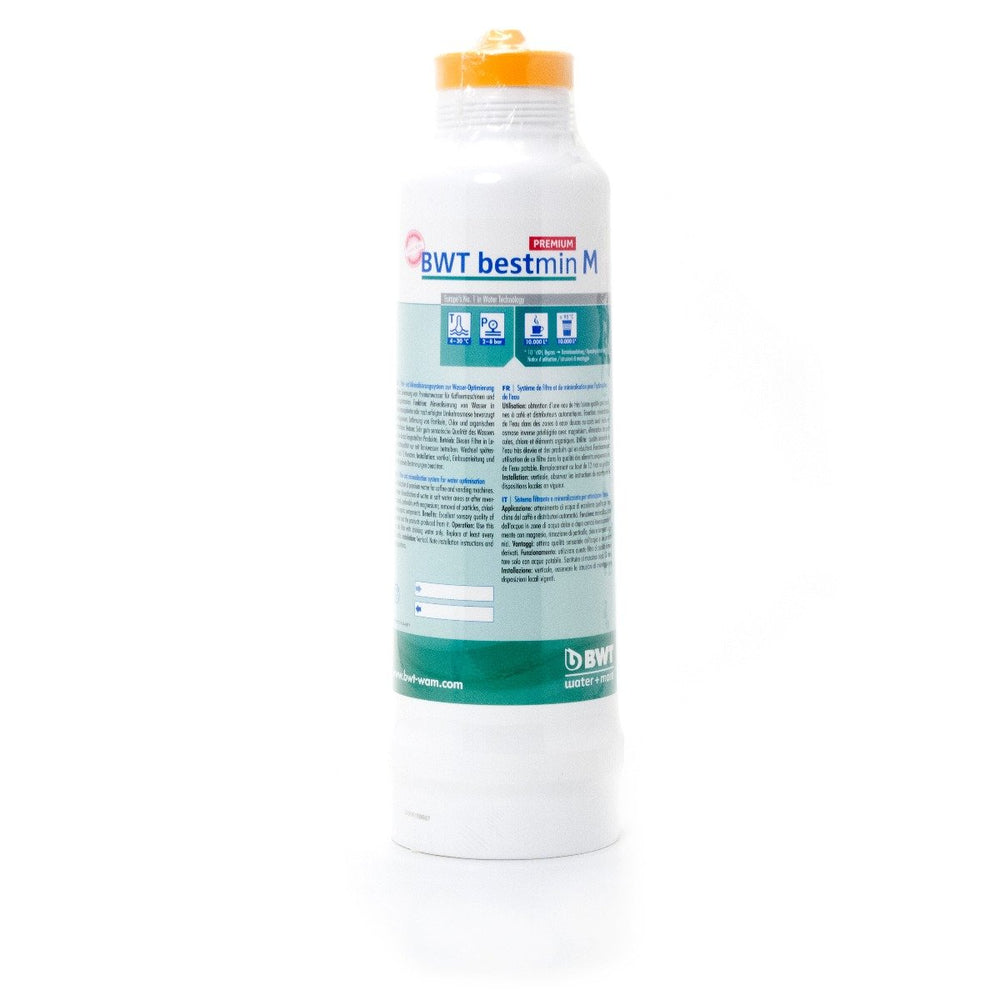
$239.99
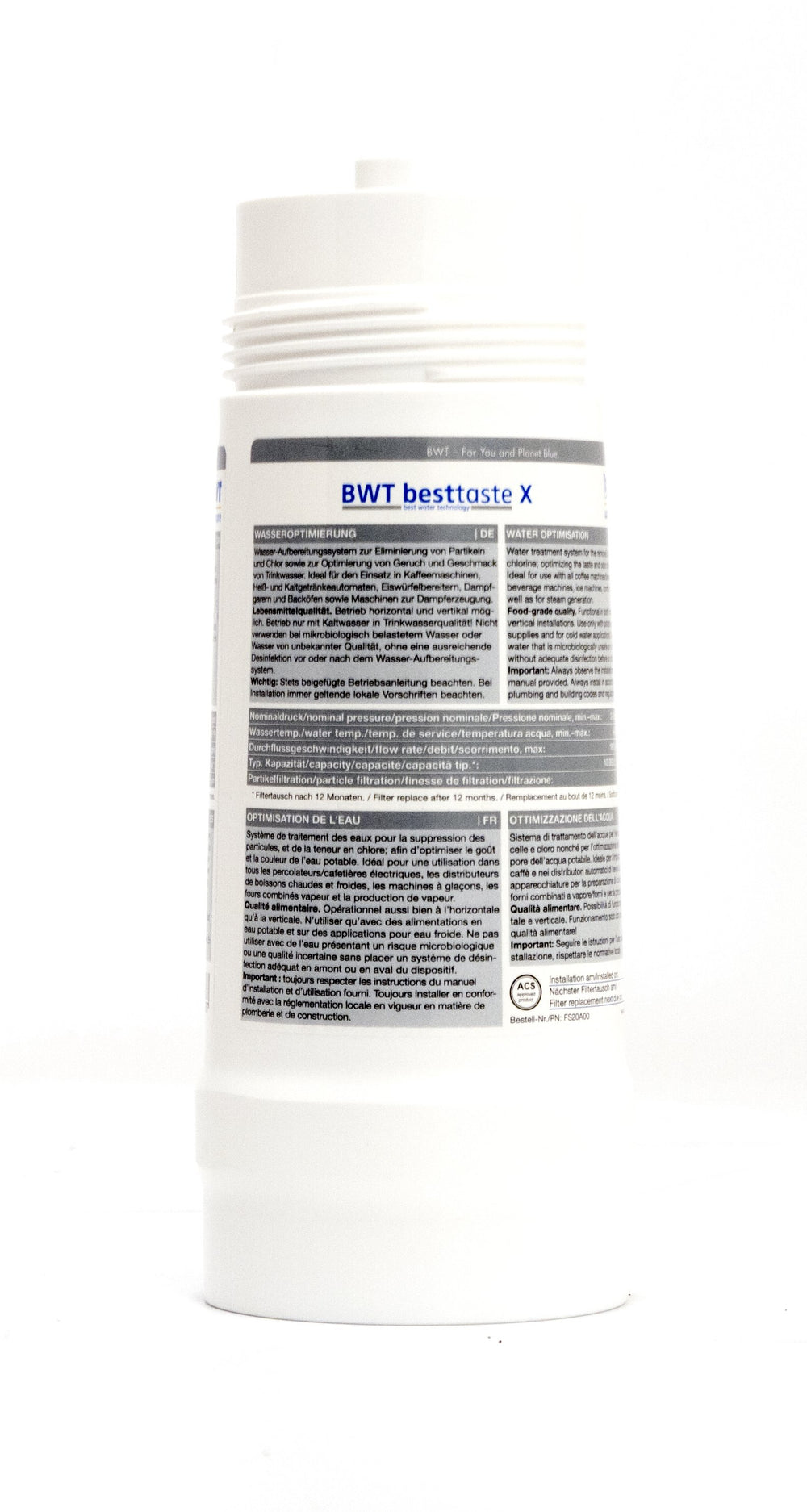
$109.99
The Adapter
Use the BWT Bestcup Cartridge Adapter to install a BWT Bestcup filter cartridge in the water tank of your prosumer espresso machine. This adapter is small enough to be place anywhere within the water tank, and comes with an included suction cup as a securing option if needed.
The Package
The BWT Bestcup M Package bundles the BWT Bestcup M Premium filter cartridge with a one time purchase filter adapter, allowing you to install the system into the following machines: ECM (Casa V, Classika PID, Mechanika Slim), Profitec (Pro 300, Pro 500, Pro 600, Bezzera (Hobby 01, BZ10, BZ07), Gaggia (Classic and Classic Pro), Rancilio (Silvia).
In-Tank Water Filters
Great for super-autos or semi-auto/prosumer machines that you aren’t going to plumb, these water filters are placed directly into the reservoir to trap and filter contaminants. For those of us who can’t (or aren’t quite ready to) plumb our espresso machines, in-tank filters are a good choice if you just need to filter the water for your machine. BWT’s solution to this conundrum is the Bestsave filter system.
Unpack the filter, give it a rinse, and toss it into your machine. The filters require an activation time of 8 - 10 hours, so you’ll want to be sure to toss them in overnight so that they’re ready to go in the morning. Similar to the Bestmax inline filters, the Bestsaves use an ion exchange that binds calcium ions in the water to prevent scale buildup. They also catch heavy metals like copper and zinc as well as chemicals like chlorine.
If you’re not sure which Bestsave filter is best for you, don’t fret! It’s easy to choose based on the size of your reservoir:
Water Pitchers
The last water filtration solution we’ll discuss is a filtered water pitcher. Many of you may be familiar with Brita water filters and pitchers, but my personal favorite is BWT’s Penguin is a 2.7 L water pitcher that uses their patented Magnesium Mineralizing Cartridges to filter water and introduce magnesium for a near-neutral pH balance. The cartridges use a combination of fine mesh screens as well as activated carbon which exchanges scale causing calcium, copper, and lead for magnesium.
$57.99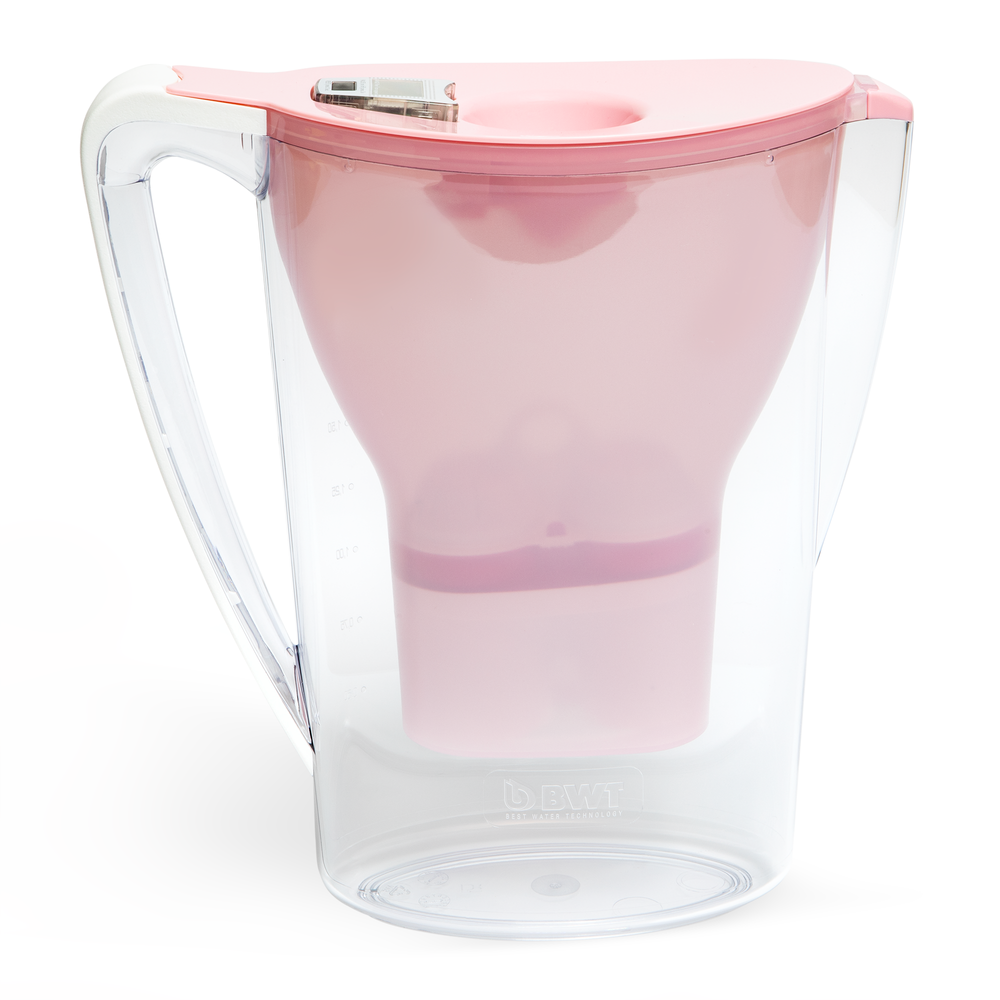
Chlorine is also nabbed to prevent it from affecting the taste (or smell) of your water. For home brewers (like me) who also use methods like pour-over or French press, having a pitcher full of filtered water means you can enjoy the best tasting coffee no matter how you choose to brew.
Parting Thoughts
Regardless of what kind of equipment you have at home, better tasting water with the proper mineral content will give you better-tasting coffee; this will also cut down on maintenance on your equipment. For help calculating your water hardness, use our calculator here. You owe it to yourself (and your machine) to filter the funk ASAP.
 Canada
Canada

